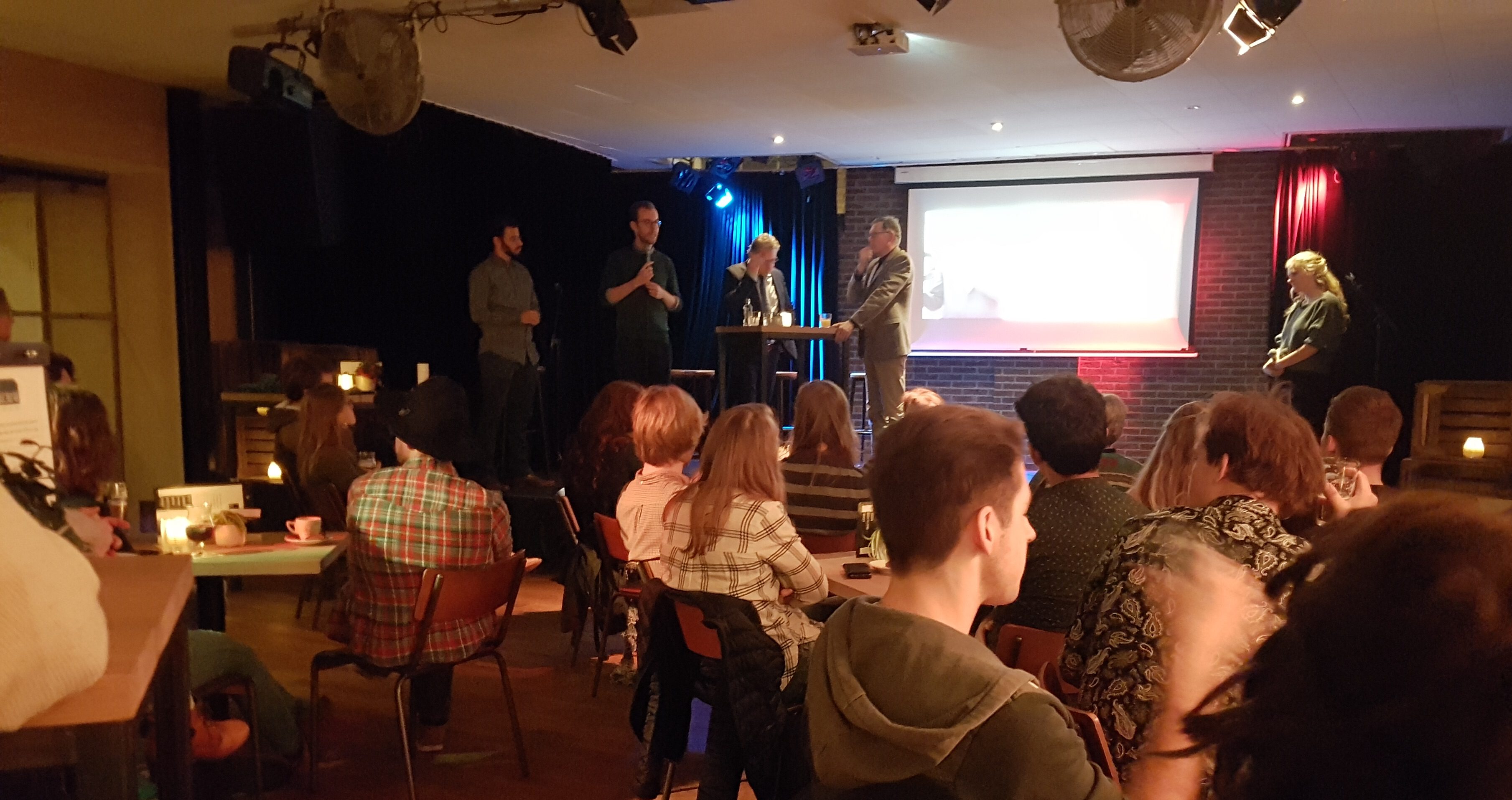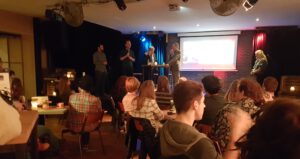On December 4th there was a fruitful discussion on Dutch agricultural policy under the pleasure of a drink in Café Loburg. As a reaction on the nitrogen discussion and farmers protests, Boerengroep decided to look at the problem from a bit of distance, and discuss the fundamental mechanisms which lead to repeated crises over the course of history. Together we can use this reflection moment to look into the future.
As the speakers introduce themselves Jeroen Candel (chairgroup Agriculture and Food Policy) mentions that there is a systemic challenge when looking at the Dutch agricultural policy. He says the ‘Nitrogen crisis’ is an example of reactive policy. Secondly Peter van Drenth (depute Gelderland on rural development) kicks off saying that looking at percentages of which sectors are contributing to nitrogen emissions is nonsense. There is an acute problem, and everybody should work on it together, we should not spend time pointing fingers. Also he mentions that maybe we have to look at how thing were in the past, and stop thinking that we can fix and control everything in our environment. The third speaker Tom Kulman (used to work at Wageningen Economic Research) says reactivity is a problem but wonders if fundamental changes in governance are actually possible, however on the other side, reactive policy is not working thus might not survive. He mentions that fundamentally it is problematic that a government is temporary and therefore untrustworthy. The fourth speaker Guus Geurts (Platform ABC) is very critical about the influence of free trade agreements, he sais this is what fundamentally makes it impossible tpo produce sustainably if one has to compete on the world market. He says that CAP used to be a policy to protect markets but has been transformed to fit in a free trade world and therefore does not work anymore. He also mentions that stopping milk quota has had a huge influence on the nitrogen crisis. His message to farmers is to direct themselves to EU and solve these problems in the EU as a whole and protecting markets.
The first question on whether farmers organizations should come with a solution to the nitrogen problem
all agree that farmers should be involved, but is up to the government to make decisions. Jeroen highlights that LTO is a very powerful organization that continuously influences policy, and that it is weird that farmers claim not to have has their say is the PAS policy.
The second question was whether the Netherland has to be a frontrunner in sustainable agriculture within the EU.
Tom explains that the Netherlands has been frontrunner throughout history in many things, for instance gay rights He says this makes the Dutch believe they also have to be a frontrunner rin agriculture but that is very unrealistic. They are actually one of the most ‘dirty’ countries in the EU. Peter says that NL usually has quite an influence in the EU when it comes to setting goals for sustainability. However, the country is very busy and full, therefore being a frontrunner in sustainable agriculture is quite impossible. He criticizes the Dutch ambition to be influential in the EU, because we are a very polarized country. Guus says that the divide between activists and farmers is largely due to the unfair prizes of the farmers and therefore we have to protect the EU borders. Jeroen adds that in other EU countries protests are about policies that have higher environmental ambitions that the obligations set by the EU, NL can never the a frontrunner.
The third question as about removing animal rights (rights of farmers to have animals) which are not being used at the moment.
Tom says this is tricky, because we are talking about a fundamental principle of property rights to which we attribute a lot of value in our society. Peter explains that provinces cannot simply buy the animal rights, this is forbidden by law. It is only possible to take away the permits when a farmer has gotten the permit but is not using it for s long time. In that case the animal rights are being removed at the moment. Peter says this is not going to solve the nitrogen problem. Guus says there needs to be an integral solution with all sectors and markets have to be protected to be able to do so.
How can we protect markets?
Jeroen says it is not so hard, CAP was invented for this purpose. The question is whether people want it. There are two ways to get sustainable agricultural production: protect markets or make world-wide sustainability standards. Peter says we shouldn’t stir on production, but on what is allowed to be sols in supermarkets. Tom asks the questions on whether it is ok to buy palm oil is we put sustainability demands on it.
How can we make consumers pay for sustainable products?
Jeroen says True Pricing is a very nice example, but this is not something that can be done tomorrow. Fiscal policy is needed trough a tax system. The audience asks why this does not happen. Peter explains that there are different political steams: to influence market or not to influence market. Typical in NL is the ‘poldermodel’, meaning that there will be a middle way in the end, not leading to any strong enough changes. Tom says we need three things: agreement, integrating farmers in emission mitigation systems and taxes on food.
Does WUR need to participate in finding the way to execute circular agriculture?
Jeroen says it is important we maintain a diversity of visions in WUR and remain critical and independent. Wageningen Research may advise the government but not co-govern. Tom agrees, and adds there are more good institutes that van add. The public asks whether Unilever on campus is a sign of independence of science. Peter says WUR is independent because there is a lot of government money going to research. He also says we will need large companies for a transition to sustainable food systems. Jeroen says most research is independent, but also pleads for a diversity of organizations on campus like NGO’s for instance. From the audience a critical note is posed that many chairs are paid by private money. Peter says that this is normal and that all kinds of streams are allowed to create a chair. Tom thinks that sometimes there is true synergy between goals of researchers and companies. Also, it is the scientist’s role to maintain his o her independence.
There is a short term thinking pattern in the current system, are you optimistic about the future within this system?
Tom says that if things don’t work, eventually the government will turn to the right direction. Jeroen points out that sustainability has never been as high on the agenda as now. Guus says the government was never as anti-multinational as now, this gives him hope. Peter says he would not work in this field if he wouldn’t believe in it.
The speakers are asked to come up with a final slogan. Peter says sustainable, economic, eco. Guus says fair price, sustainable product. Jeroen requests the students in the room to become politically active because this is where it all happens. As a conclusion of the evening one could say: maybe this political system is not suited for long term changes.


